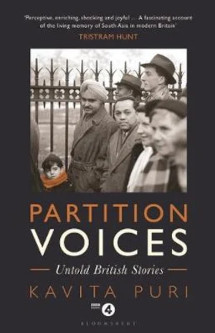Partition voices by Kavita Puri

Bloomsbury, 2019. ISBN: 9781408899083.
(Age: secondary/adult) Highly recommended. The partition of India
along religious lines in 1947 will be remembered as a monumental
disaster as 10 million people tried to get to the country of their
religious majority with about 2 million losing their lives. Many
fled the place they were born, and of these, thousands came to
England where they buried what had happened and made a new life for
themselves. Until recently their voices had not been heard. Two
years ago award-winning journalist and broadcaster Kavita Puri
produced a three-part series, Partition Voices for BBC Radio
4, winning the Royal Historical Society's Radio and Podcast Award
and its overall Public History Prize. This has now been made into a
book, "to remember the time before separation, so future generations
understand that there were Hindus in Lahore, and Muslims in
Amritsar".
Puri has divided the book into three sections, End of Empire in
which she summarises the British Raj and its place in India along
with the growing resentment of British rule, Partition, and Legacy.
Each story is unique, from Muslim, Hindu, Sikh and Christian, all
keeping silent for seventy years about what they had been involved
in or had witnessed, many wanting to forget.
Ken from an English family which owned a jute mill, now living in
Dundee, recalls seeing body parts blocking the waterways, and twelve
year old Ramen, a Hindu living in Dhaka calling out 'hunt the
British' with others in the streets, Muslim Bashir having to leave
his house in the Punjab, knowing it would be looted as soon as they
left, but after seeing the train carriages full of dead bodies in
Lahore Railway Station, he knew he could not stay.
Story after story crowd around the reader, and anger about partition
increases, but I was surprised to find that some of the interviewees
thought it a good thing.
Some girls were killed by their male relatives saving them from rape
and murder but also forced marriage. It was estimated that some
30,0000 women and girls were removed by Hindu and Muslim men, many
ending up in the Ashrams set up across Northern India for destitute
women, those whose families would not longer accept them, and those
orphaned by the violence.
In the midst of the violence and mayhem some acts stand out as
beacons of humanity. A Muslim family, the Begums, took weeks to get
to the refugee camp at Behram there to be helped by a friend, a
Hindu teacher, to get across to Pakistan.
Mohindra Dhall recalls his father rushing in to get them packed and
away. He had opted to stay in Pakistan but seeing violence escalate,
they headed for the railway station. There the train was crowded so
they waited for the next, realising in a few days that they would
all be dead if they had taken that first train.
Getting to the basics of why these people chose to emigrate to
Britain after Partition is difficult; some hate Britain for what it
did, dividing the country, but still chose to live there, some
thought Partition a bad idea, some a good idea, some want to return,
while others have returned often to the place of their birth. The
book is enthralling in showing such a range of stories and
experiences, a range of opinions and points of view about an event
put into effect with little planning and unforeseen, far reaching
consequences. Themes: India, Partition, Religious conflict,
Massacre, British Raj, Migration.
Fran Knight